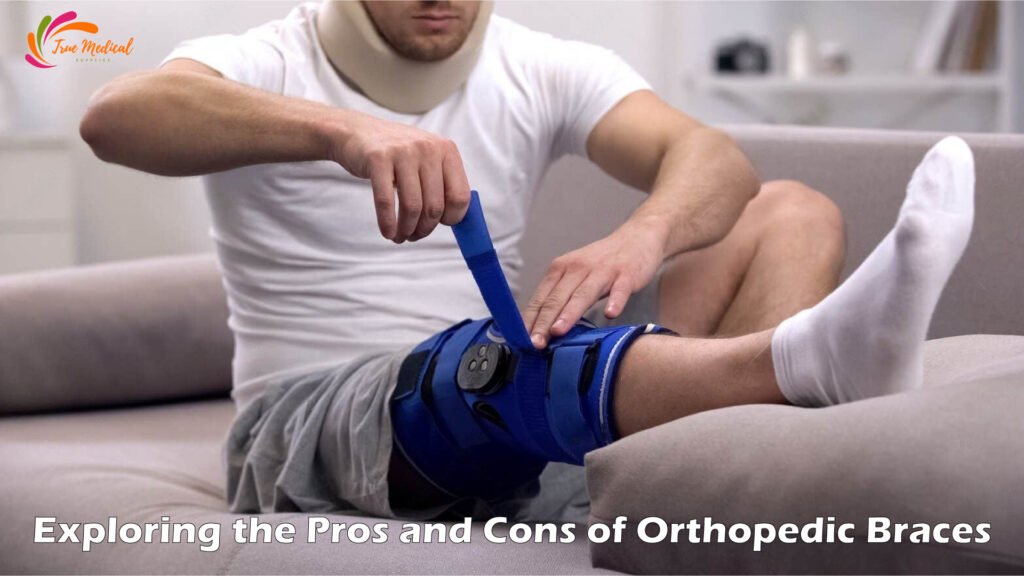
Orthopedic Braces have become a prevalent and valuable intervention in musculoskeletal health. The specialized medical devices available through True Medical Supplies are designed to provide support, stability, and relief to individuals dealing with various injuries and chronic conditions affecting bones, joints, and muscles. While braces from us offer many benefits, they also have drawbacks. In this detailed post, we will go deeper into Exploring the Pros and Cons of Orthopedic Braces, equipping you with a thorough understanding.
Pros of Orthopedic Braces
Pain Relief and Support:
Orthopedic braces are engineered to target specific body areas, offering a significant degree of support and stability. By limiting movement in the affected region, braces help alleviate pain by reducing the strain on injured joints or muscles. This support eases discomfort and promotes healing by preventing further damage.
Improved Mobility:
Specific orthopedic braces, such as those designed for knee, ankle, or wrist injuries, strike a delicate balance between support and mobility. These braces provide controlled movement, allowing individuals to engage in daily activities more comfortably while minimizing the risk of exacerbating their condition.
Posture Correction:
Poor posture has become a widespread concern in the age of sedentary lifestyles, leading to numerous issues. Orthopedic braces are crucial in addressing this problem by providing gentle reminders to maintain proper alignment. These braces encourage the development of better posture habits, which can have far-reaching positive effects on spinal health and overall well-being.
Avoiding Surgery:
For certain conditions, orthopedic braces can be a non-invasive surgery alternative. By providing practical support and stability, these braces help individuals manage their needs without resorting to invasive procedures. This eliminates the associated risks of surgery and aids in faster recovery.
Customization for Enhanced Effectiveness:
Modern orthopedic braces offer a high degree of customization. They can be adjusted to an individual’s body shape and conditional requirements. This personalized approach ensures optimal comfort and effectiveness, increasing the likelihood of positive outcomes.
Variety of Conditions:
Orthopedic braces cater to various conditions, from acute injuries to chronic ailments like arthritis. Whether it is a sprained ankle, a fractured wrist, or a degenerative joint disease, a brace is likely designed to provide the proper support and relief.
Cons of Orthopedic Braces
Discomfort and Skin Issues:
Extended wear of orthopedic braces can lead to discomfort, skin irritation, and chafing. The materials used in braces can cause sweating and itching; in some cases, prolonged contact with the skin might even result in skin breakdown. Proper care and regular adjustments are necessary to mitigate these issues.
Muscle Weakness:
While orthopedic braces offer support, prolonged dependency on them can lead to muscle weakness and atrophy. Muscles not actively engaged due to the brace’s support can lose strength over time. It can pose challenges once the mount is no longer needed, as individuals might need to rebuild muscle strength.
Restricted Movement:
Although orthopedic braces aim to balance assets and mobility, they can still limit specific movements. While wearing a brace, engaging in physical activities that require extensive joint movement may be challenging. This limitation can be frustrating, especially for individuals who are used to an active lifestyle.
Psychological Impact:
An orthopedic brace can have psychological effects, impacting an individual’s self-esteem and body image. The visibility of the brace, especially in more exposed areas, might lead to self-consciousness and a sense of being different from others.
Cost and Maintenance:
Orthopedic braces, particularly custom-designed ones, can be expensive. Additionally, ongoing maintenance and potential replacement due to wear and tear can add to the financial burden. It is essential to factor in these costs when considering orthopedic braces.
Dependency Concerns:
There is a potential risk of becoming overly reliant on orthopedic braces. While they provide immediate relief and support, individuals might use them excessively, hindering natural healing and muscle development.
Orthopedic braces offer a valuable and versatile tool for managing various musculoskeletal conditions. Their ability to provide pain relief, support, and improved mobility is unquestionable. However, the decision to use an orthopedic brace should be made after a thorough assessment of the individual’s condition, lifestyle, and preferences. Consulting with a qualified medical professional is paramount in determining whether the benefits outweigh the drawbacks.
By carefully considering, individuals can make informed choices for their long-term musculoskeletal health and overall well-being. For more information or to explore various Orthopedic Braces, contact the True Medical Supplies team through the contact form.
